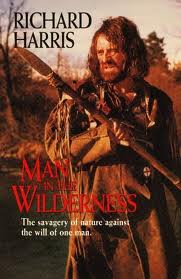Certainly one of my favorite actors of the 1960s-70s and even later was Richard Harris, especially to be remembered for his role as King Arthur in Camelot (the musical). He was also a sometime singer (most famous for his rendition of the Jimmy Webb tune MacArthur Park), but he was a better actor than a singer. What is less well known is that he did a series of Westerns, one of which is particularly worth comment— Man in the Wilderness (1971) [and kudos to Steve White for the tip on this movie].
The story of this film is loosely based on a true story about trappers in the 1820s in the Northwest Territory, more particularly based on the 1818-20 Missouri Expedition and “Capt. Henry” in the film (played by John Huston, Angelica’s father) is likely a fictionalized Major Andrew Henry of the Rocky Mountain Fur Company. The film however focuses on a scout called Zachary Bass in the film (real name Hugh Glass), who was abandoned by his father, abused by his Christian school teacher, lost his wife in childbirth, and left his son to be raised by his wife’s mother so that he could make a living being a scout for the Missouri Expedition.
The film involves a remarkable idea– the notion that a medium sized boat could be placed on a wagon and dragged across mountainous terrain by a 20 mule team, manned by various trappers, to the Missouri (or Platte) head waters and then placed in the water to go downstream to a city where a fortune could be made selling all the hides collected in the Northwest territory. This exotic scheme however provides only the somewhat farcical backdrop for the story of Mr. Bass, a soul in travail. I’ll not spoil the ending of the story about the boat.
The basic plot is that Zachary Bass, played by Harris is a scout for this outlandish venture and is badly mauled by a bear in the wilderness, and is left behind for dead by his fellow travelers, even though they know that he is still alive (barely) when they leave him. Most of the hour and 45 minute film is a story of survival in the wilderness with winter coming on, despite heavy odds, wild animals, curious Indians, considerable wounds and no real food. And yet, all that is a true part of the story. Man’s desire to survive and go on living is often so strong that almost superhuman feats are accomplished to make that possible.
But something even more remarkable than physical survival happens when Bass is left to die. He becomes spiritually alive again. A Bible was left to be buried with Bass by one of the other trappers, and initially all the Bible does is provide some kindling for a fire. But then, as the recovery goes on, and Bass’s physical life is no longer in danger, he begins to read the Bible. He reads verses like ‘unless a seed be buried in the ground and die, how can it live again’? Or ‘if the tree be cut down, will not a shoot spring from the stump’? It dawns on Bass that that is his story, and he has a new chance at life— a better, more loving life. He can go and forgive those who abandoned him, and then return home and build a relationship with his son. And so what starts out as a great adventure in the flesh of dragging a boat across mountains to make a fortune from pelts, turns into an inward journey towards healing and wholeness and a more Christian life. It is a transformation well worth watching.
In some respects this film is rather like the Tom Hanks’ Castaway film where Hanks ends up personifying a soccer ball and talking to it. In this film Bass catches a bunny rabbit and reads the Bible to it. There are other interesting parallels as well.
While this is not your stereotypical Western, it does mine the frequent theme of redemption that recurs in many classic Westerns. It reminds us of a day when even Hollywood was not afraid to explore Christian themes in a full budget major cinema production. Those days, alas, are mostly gone.













